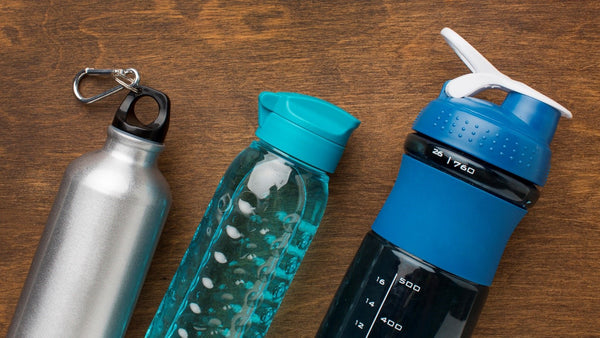
Water bottles have evolved into indispensable accessories, facilitating hydration in our fast-paced lives. The importance of staying hydrated cannot be overstated, considering water's pivotal role in maintaining overall health. Proper hydration supports cellular functions, cognitive performance, physical endurance, digestive health, and temperature regulation.
Research underscores the significance of hydration. According to the National Academies of Sciences, Engineering, and Medicine adults should aim for 3.7 litre (125 ounces) for men and 2.7 litres (91 ounces) for women daily. Mild dehydration, as noted in the "European Journal of Nutrition," can impair cognitive performance, affecting attention and memory. The American Council on Exercise emphasizes that a mere 2% body weight loss due to dehydration significantly impairs physical performance.
The benefits of staying hydrated are pretty obvious. We’ve been learning the importance of drinking water since our childhoods. Some believe that hydration is the best skincare and it can ail a host of ailments. It’s a simple solution that has tons of benefits. Water bottles offer a practical solution to meet daily hydration goals. They aid in maintaining cognitive functions, sustaining physical endurance during activities, and supporting digestive health. As a cooling mechanism, hydration is crucial for temperature regulation, especially in warmer climates or during exercise.
Why Invest in Good Water Bottles?
- Investing in good water bottles is a crucial step towards prioritizing your health and well-being.
- Opting for high-quality water bottles ensures that you have a reliable and safe vessel for staying hydrated throughout the day.
- Good water bottles are often made from materials that are free from harmful chemicals, preventing potential leaching of toxins into your drinking water.
- They are designed to be durable, minimizing the risk of leaks or breakages, making them a sustainable and long-term investment.
- Moreover, certain water bottles come with features like insulation, keeping your beverages at the desired temperature, encouraging you to consume more water consistently.
- Choosing a water bottle that aligns with health and safety standards not only promotes eco-friendly practices but also contributes to your overall health by providing a trustworthy and convenient means of meeting your daily hydration goals.
Let’s explore a variety of water bottle options available for your selection
1. Stainless steel water bottles:
- Pros: Durable and resistant to rust, providing a long-lasting solution. Stainless steel is non-reactive, ensuring that it doesn't impart or retain flavours. Stainless steel water bottles are typically BPA-free, making them a safe choice for health-conscious individuals.
- Cons: Can be heavier compared to other materials. May not offer insulation properties without an additional layer.
If you are looking for an insulated stainless steel water bottle, you can check out our Zoku stainless steel water bottle range.
2. Plastic water bottles:
- Pros: Lightweight, convenient, and often more affordable. Plastic bottles are available in various shapes and sizes, catering to different preferences. Some are reusable, reducing environmental impact.
- Cons: Concerns about potential chemical leaching, especially with low-quality plastics. Prone to scratches and may retain odours over time. Environmental impact due to single-use plastic consumption.
3. Glass water bottles:
- Pros: Provides a clean and neutral taste, free from chemicals. Glass is a recyclable and eco-friendly material. Resistant to odours and stains, maintaining the purity of the beverage.
- Cons: Fragile and prone to breaking, making them less ideal for certain activities. Heavier compared to plastic or stainless steel. Limited insulation properties.
At thinKitchen, we bring to you some of the most sturdy glass water bottles from top international good water bottle brands. Check out the collection now.
4. Copper water bottles:
- Pros: Known for antimicrobial properties that can potentially kill harmful bacteria. In India, many believe that copper water bottles offer health benefits, such as aiding digestion and promoting joint health. Durable and resistant to corrosion.
- Cons: Copper water bottles require regular cleaning to prevent tarnishing. Some people may be sensitive to the taste of copper. Relatively heavier compared to plastic.
5. Terracotta water bottles:
- Pros: Naturally porous, allowing water to cool through evaporation. Terracotta is eco-friendly and biodegradable. Can impart a unique earthy flavour to the water.
- Cons: Fragile and prone to chipping or cracking. Absorbs flavours, which may affect the taste over time. Limited insulation properties. Terracotta water bottles are great for home consumption as the bottles aren’t travel-friendly.
With a growing awareness of health and wellness, there has been an increased interest in specialty and functional waters, including mineral water, alkaline water, and flavoured water. So which water bottle is good for your health? The answer depends on various factors such as personal preferences, health conditions, beliefs, lifestyle, and environmental considerations. Stainless steel and glass water bottles are often recommended for those prioritizing durability and taste neutrality, while plastic, copper, and terracotta water bottles cater to specific needs and preferences. Whatever your preference, thinKitchen has got you covered.

